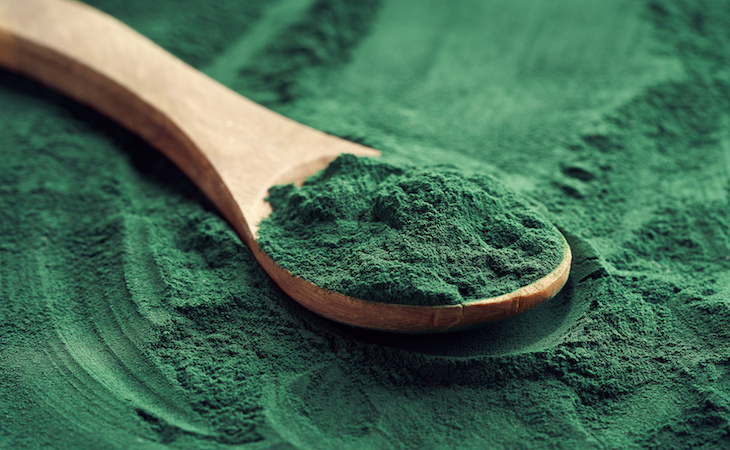
Spirulina, a nutrient-rich blue-green algae, offers numerous health benefits, including improved sleep, reduced inflammation, balanced hormones, and increased satiety. Its high protein, vitamin, and mineral content supports energy and detox cycles, promoting restful sleep. Potential side effects include digestive issues and headaches, so gradual dosing and doctor consultation are recommended.
There are many popular supplements out there—but these days, it’s all about spirulina.
While some of these ingredients or herbs can be a flash in the pan, studies on spirulina show that it does have a variety of health benefits, including better sleep.
Ahead, we’ll explore the benefits of spirulina and how to add it to your routine so you can catch quality Z’s.
What is spirulina?
Spirulina is a type of blue algae, or cyanobacteria, that grows in salt or fresh water sources, explains Stacy Mobley, licensed naturopathic doctor.
“It was first known to be used by ancient Aztecs and has now regained popularity around the world for its multifaceted health benefits,” she says.
It’s packed with antioxidants, protein, vitamins, and minerals and is typically taken in the form of a powder, soft gel, capsule, or tablet, says Mobley.
“One tablespoon (equivalent to 7 grams) of quality spirulina has 4 grams of protein, calcium, iron, magnesium, phosphorus, calcium, and good healthy fats that resembles fish oil,” she says.
Spirulina and sleep
So, is there a connection between spirulina and better sleep? It turns out there is. By giving you the raw building blocks to keep the biochemical and physiological pathways functioning properly, it allows your body to fuel and naturally detox throughout the day, says Mobley.
“This energy expenditure cycle then allows the body to go through its natural energy and rest states,” she explains. “The rest states typically happen at nightfall, based on a healthy circadian and cortisol rhythm that triggers the body to fall into a restorative sleep.”
She adds that there are studies confirming the link between spirulina and sleep.
Other health benefits of spirulina
Spirulina has other potential health benefits in addition to helping you achieve quality sleep. It can provide you with enough healthy protein to decrease overeating and increase satiety, says Mobley. It can also decrease inflammation, which gives your body the space it needs to use resources to heal other key areas, she says.
“It helps to balance hormones, which helps in the female menstrual cycle as well as prostate health in men,” adds Mobley. “It helps to boost eye health as there are carotenoids present in this blue algae.”
Potential side effects of spirulina
There are some potential side effects of taking spirulina. Digestive issues such as bloating, gas, and upset stomach are the most common side effects of spirulina, says Mobley.
Headache is another reported side effect, she adds. “This is why it is suggested to work your way up to a typical dose, just in case,” she advises.
There are several instances in which you should check with your doctor before taking spirulina. You’ll want to discuss spirulina with your doctor if you’re pregnant, have metabolic issues that affect the kidney or liver, or have diabetes (while keeping an eye on blood glucose numbers to ensure there are no drastic changes). And in general, it’s always wise to talk with your health provider before taking any new supplement.
Then there are those who shouldn’t take spirulina. “Those with issues processing phenylalainine should not take this supplement as it has high amounts of this amnio acid in its protein makeup,” says Mobley. “Those with bleeding disorders or on blood thinners should consult with their doctors.”
The best way to avoid side effects is to select a quality supplement and take it as directed, says Mobley. “Always speak to a trained or licensed natural health or your primary care doctor to ensure it does not interfere with any medications you are currently taking,” she says.
How to add spirulina to your diet
To consume powdered spirulina, Mobley suggests adding a scoop to a smoothie, blending it into a healthy green açai-style smoothie bowl, including it in homemade protein bars, and adding it to green juices.
As for other forms, such as capsules, tablets, or soft gels, “please take as directed on the supplement bottle or your trusted health provider,” suggests Mobley.
It’s not recommended to take more than 8 grams (1 tablespoon is about 7 grams) per day, she adds. “Each person should work their way up to this dose while watching for common side effects such as digestive issues or headaches,” she says.
In general, Mobley says you can take spirulina “whenever you can remember to take it.” Otherwise, morning or afternoon is an ideal time to take it, giving you the nutrients and energy you need throughout the day.
“For some people, it can cause an energy boost, so it’s best to take it early afternoon to avoid interfering with sleep,” says Mobley. “With those who do not experience this energy boost, you can take it closer to bedtime as the benefits are still present.”
FAQs
Does spirulina make you sleep?
Spirulina can give your body “raw building blocks” to keep the biochemical and physiological pathways functioning properly, which allows the body to fuel and naturally detox throughout the day, says Mobley.
This energy expenditure cycle then lets the body to go through its natural energy and rest states. The rest states typically happen at nightfall, based on a healthy circadian and cortisol rhythm that triggers the body to fall into a restorative sleep.
Is spirulina better morning or night?
Since spirulina can give you an energy boost that may impact sleep, Mobley suggests taking it in the morning or early afternoon. This will also provide you with energy to get through the day.
Is spirulina good for anxiety?
“Yes, absolutely, given the broad spectrum of vitamins and minerals, including protein, it helps to give the body what it needs to not only help with anxiety but also depression,” says Mobley.
What is the downside of spirulina?
Mobley shares one downside of spirulina: You might think it covers all the bases and focus less on prioritizing an overall healthy diet. “We must remember that this is just a supplement,” she says.
Another downside is a quality version of spirulina can be expensive, so focusing on a well-rounded diet is the best focus for getting healthy, says Mobley.
The secret to a good night’s sleep might be magnesium. Next, learn all about the benefits of magnesium for sleep.
Shelby Deering
Shelby Deering is a Madison, Wisconsin-based freelance lifestyle writer contributing home design and health articles to national publications. When she’s not writing, you’ll find her hiking, running, or walking with her husband and corgi, Dolly.



